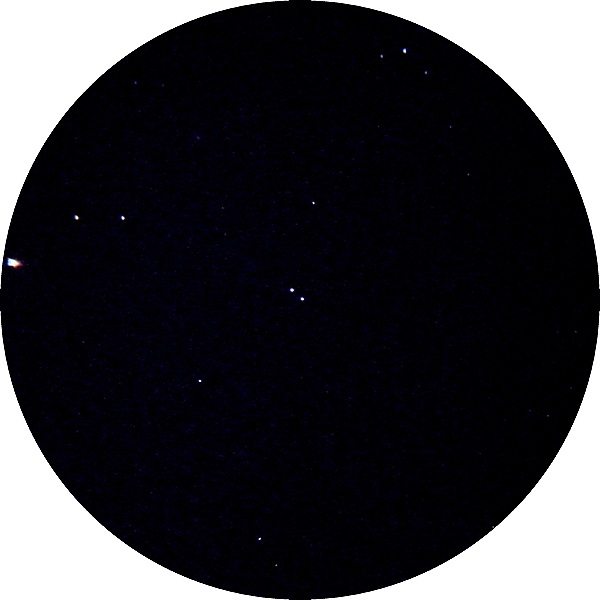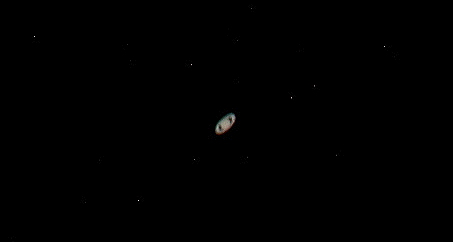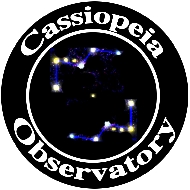Venus; iPhone M40, M106, M109;
Saturn-Mars Conjunction; Jupiter; Moon
Posted: 2 April 2018
Saturday, 31 March 2018, was cloudy. I supported the "Blue Moon Sky Viewing/Trail Music Extravaganza" that evening at Oracle State Park. I managed to get some Moon photos through the clouds. Click the link to see them. Sunday, 1 April, the sky began clearing mid-day.
|
Open: Sunday, 1 April 2018, 1818 MST Temperature: 86°F |
Session: 1217 Conditions: Mostly clear |
Equipment Used:
12" f/8 LX600 w/StarLock
2" 24mm UWA eyepiece
2" 30mm eyepiece
2" 2X PowerMate
Camera:
D850 DSLR
iPhone 8 Plus
1824 MST: LX600 ON, StarLock OFF, High Precision OFF.
Viewed Venus, 102X.
Mounted the D850 DSLR at prime focus + 2X PowerMate.
1835 MST: took an HD video recording of Venus, 1/500sec, ISO 320, 60 fps, for 20 seconds. As the D850 DSLR does not support using the Vello remote to start/stop video recording, I trimmed the beginning and ending to remove the image vibrations from touching the camera record button. That left 17 seconds of usable video. This is a stack of 1046 video frames using Keith's Image Stacker and enlarged 200% showing Venus and its slightly gibbous phase:

Removed the camera and viewed Venus, 203X. The gibbous phase was visible. Then viewed Venus, 81X.
1846 MST: sunset.
1910 MST: High Precision ON. Did a GOTO M40 (double star). The stars were faintly visible, 81X. 1911 MST: High Precision OFF. Using High Precision was helpful as the twilight sky was still very bright. Began waiting for the sky to darken.
1940 MST: mounted the iPhone 8 Plus on the 2" 30mm eyepiece.
1943 MST: StarLock ON.
Took this iPhone afocal 81X StarLock autoguided image of M40 using the iOS app NightCap Camera (Long Exposure, Light Boost, ISO 5000, 1/3sec, 1 minute):
Messier 40

1949 MST: StarLock OFF.
Slewed the 12" telescope to several Messier Catalog objects to check their position. I plan to image many Messier objects using the iPhone this month.
2000 MST: eastern sky brightening from the rising waning gibbous Moon.
2005 MST: StarLock ON.
Took these iPhone afocal 81X StarLock autoguided images of M106 and M109 galaxies, NightCap Camera (Long Exposure, Light Boost, ISO 8448, 1/3sec, 1 minute):
Messier 106

Messier 109

I was surprised to be able to image some spiral arm structure in M106. M109 appears as just a fuzzy dot.
2011 MST: StarLock OFF.
Viewed M109, 81X. The galaxy was faintly visible against the moonlit sky. Then viewed M109 (galaxy) and M51 (Whirlpool Galaxy), 102X. The bright sky hampered the view.
2021 MST: LX600 OFF.
|
Close: Sunday, 1 April 2018, 2030 MST Temperature: 65°F |
Session Length: 2h 12m Conditions: Clear |
I got up early Monday morning, 2 April, for the Saturn-Mars conjunction (separation 1.3°). I set up the D850 DSLR with 150-600mm lens on the SkyTracker Pro mount. I did an approximate polar alignment (Polaris was obstructed by the house).
0349 MST: began imaging. This photo shows Saturn and Mars, the open star cluster M25, and the globular cluster M22, and was taken at f/5, 20 seconds, ISO 800, White Balance Auto, FL 150mm:

Mouseover or tap on image for labels
This image shows Saturn, Mars, and M22, and was taken at f/6.3, 20 seconds, ISO 800, WB Auto, FL 600mm, and was slightly cropped in post-processing:

This highly cropped image shows Saturn and its Ring System, f/6.3, 1/4sec, ISO 100, WB Auto, FL 600mm:

Jupiter was also visible in the morning sky. This highly cropped image shows Jupiter with the two equatorial cloud bands, and the four Galilean Moons, f/6.3, 1/60sec, ISO 100, WB Auto, FL 600mm:

Mouseover or tap on image for labels
Lastly, I took this cropped image of the waning gibbous Moon, f/6.3, 1/400sec, WB Auto, FL 600:

Click or tap on image for larger version
0410 MST: ended imaging.
Comments are welcome using Email. Twitter users can use the button below to tweet this report to their followers. Thanks.
Cassiopeia Observatory Home Page
Copyright ©2018 Michael L. Weasner / mweasner@me.com
URL = http://www.weasner.com/co/Reports/2018/04/02/index.html
